 Petzlover
PetzloverKai Ken is originated from Japan but Vikhan Sheepdog is originated from Pakistan. Kai Ken may grow 12 cm / 4 inches shorter than Vikhan Sheepdog. Kai Ken may weigh 25 kg / 55 pounds lesser than Vikhan Sheepdog. Kai Ken may live 8 years more than Vikhan Sheepdog. Kai Ken may have less litter size than Vikhan Sheepdog. Kai Ken requires Moderate Maintenance. But Vikhan Sheepdog requires High Maintenance
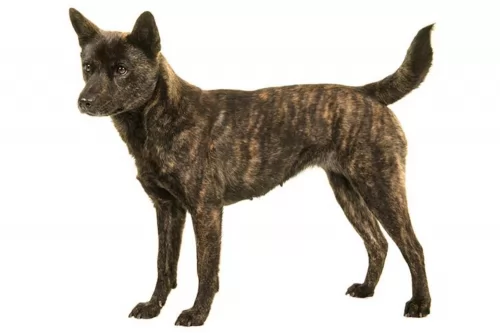 The Kai Ken dog hails from Japan and is both an ancient and rare dog. In fact the dog was discovered in 1929 in the Kai province near Mount Fuji. The dog has the nickname Tora Inu in Japan which means 'Tiger Dog'. Maybe its got to do with the brindle striped coat or his bravery.
The Kai Ken dog hails from Japan and is both an ancient and rare dog. In fact the dog was discovered in 1929 in the Kai province near Mount Fuji. The dog has the nickname Tora Inu in Japan which means 'Tiger Dog'. Maybe its got to do with the brindle striped coat or his bravery.
He falls into the working class category. In 1931, the Kai Ken Aigokai registry was formed to preserve the dog. In fact in this year Dasuke Adachi discovered these dogs and in 1934 was actually designated a Natural Monument in Japan and also protected by law.
The Kai Ken was recognized in 1934 by the Japanese Kennel Club. It is not 100% certain but it is thought that the dog was brought to the United States in the 1950s.
The Vikhan Dog is a rare breed that very little is known about. It is not sanctioned by any breed club or kennel club. The breed originally came from Pakistan in the North-west Frontier Province near the Indian border, in the Chitral region and the state of Himacchal Pradesh. For the most part Pakistan is credited with the development of the breed. They originally guarded livestock and hunting leopard. He is fast and fierce. The breed is bonded to the livestock when they are very young and instinctually guard them for the rest of their life. They do not herd them, they blend into the flock and watch for outsiders.
They confront strangers and predators with aggressive displays and vocal intimidation. If this does not work, it will attack and drive them off. They are even known for luring coyotes into a trap with food so that they can hunt them.
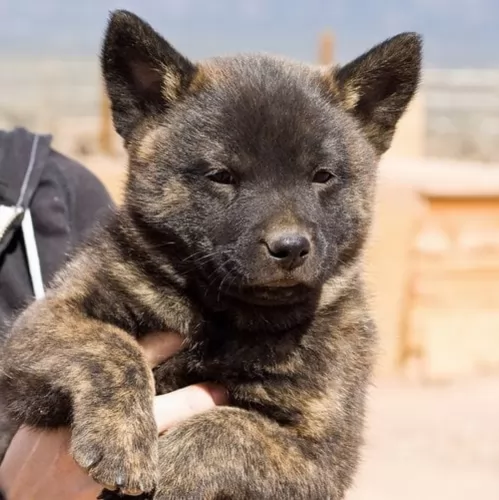 The Kai Ken has always been used for hunting purposes. He comes as recommended for hunting people and those who are active.
The Kai Ken has always been used for hunting purposes. He comes as recommended for hunting people and those who are active.
It is a medium sized dog standing at between 43 to 56cm in height both male and female and weighing between 14 and 22kg.
The ears of the dog are erect, the muzzle is fairly tapered and the nose is black. The tail is bushy like that of a fox and curls over the back. The double coat of the dog is of medium length and harsh and is a brindle color in a reddish or black shade.
Puppies are born black and then the brindle stripe-like pattern comes in later. He has an athletic body and is a keen swimmer.
The Kai Ken is an intelligent dog, loyal to his human family while being somewhat reserved around strangers. They are amicable with both children in the home as well as other pets.
He is a friendly, intelligent dog, forming close bonds with his family. Have him trained and socialized and he'll make you a splendid pet who will be willing to guard you if anyone threatens.
One look at that bright face and you can see that he is an intelligent, independent dog. He is also courageous and fearless and makes a great watchdog, especially because he is naturally reserved and suspicious with strangers.
The Vikhan Sheepdog is a large working breed that is lean, muscular and aggressive. He is immensely intelligent and fearless. He has a thick coat in solid brown, red, fawn or black. There are also multi-colored and spotted versions as well. They are related to the other regional Molossers and are sometimes called the giant Rough Collie. They are faster than they are strong. All Molossers are solid, large and share the same ancestor.
They typically have short, muscular necks and broad but short muzzles. They have heavy bones, wrinkles and pendant ears. With well-muscled legs and wide chests, the Molossers include the mastiffs and bully breeds and all other breeds that come from those groups. Molossers are either flock guardians or home guardians. The Vikhan Sheepdog is a flock guardian
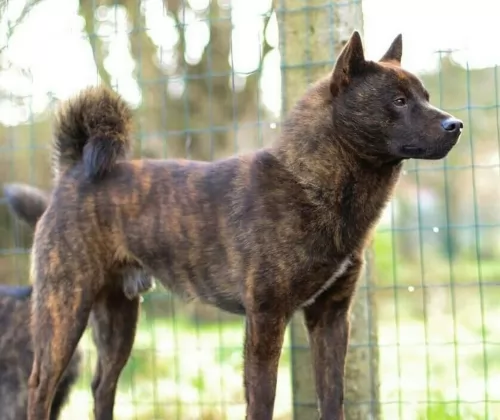 The Kai Ken is a working- and hunting dog, so he is used to being active and will want a home where he can be played with and exercised regularly.
The Kai Ken is a working- and hunting dog, so he is used to being active and will want a home where he can be played with and exercised regularly.
He can be slightly stubborn and independent so training and socialization are imperative. This is also because the dog’s curiosity and his athletic skills can lead to trouble if he isn’t properly trained.
Treat him the way he deserves and you’ll see that he is able to develop a strong bond with you and be altogether an excellent family pet.
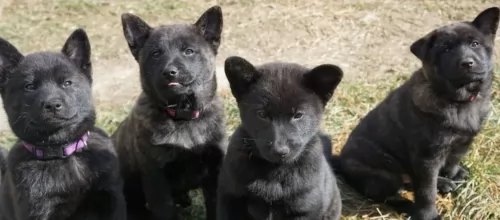 With a lifespan of 14 to 16 years, and given the genetic purity of the Kai Ken, you aren't likely to battle with congenital health problems with your dog, but it is always good to be aware of certain minor health issues that he could succumb to.
With a lifespan of 14 to 16 years, and given the genetic purity of the Kai Ken, you aren't likely to battle with congenital health problems with your dog, but it is always good to be aware of certain minor health issues that he could succumb to.
He can suffer from a few common dog diseases such as progressive retinal atrophy or hip dysplasia.
This is a disease of the eye where there is wasting of certain parts, and in this case the cells of the retina develop abnormally. This can eventually lead to blindness. It’s an inherited disease that can occur in pure- and mixed breeds, and dogs with PRA shouldn’t be used for breeding.
It isn’t a painful condition, and the first symptom usually noticed in a dog is night blindness where you may notice him bumping into things at night and being reluctant to walk around in the dark.
Because this is a rare breed having lived in isolation for centuries, little is known or documented about their health issues. However being a large Molosser, they face some of the same health challenges as all large dogs. These include
• Bloat – when the internal organs of the intestinal system are knotted or inverted. Without immediate attention it causes death under all circumstances. You need to get the dog to a vet as soon as possible.
• Hip Dysplasia – Can cause lameness in hind legs and/or arthritis. Can be treated.
• Elbow Dysplasia – Can cause lameness in the front legs and/or arthritis. Can be treated.
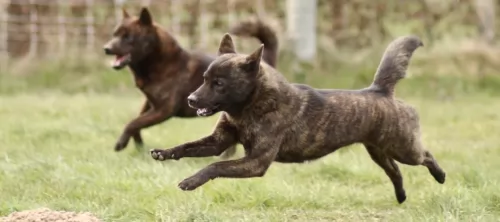 Even though the coat is thick, the Kai Ken will require basic canine care, so a brush twice a week will be enough to keep the coat free of loose hair. He sheds more heavily a couple of times a year and then he will require more brushing.
Even though the coat is thick, the Kai Ken will require basic canine care, so a brush twice a week will be enough to keep the coat free of loose hair. He sheds more heavily a couple of times a year and then he will require more brushing.
He has always been used to hunt so he is a dog that will require regular exercise such as walks, hikes, swimming and ball games.
The nails of the dog should be trimmed regularly once they become long as long nails can be hazardous and can hook onto things, causing injury to the nail area.
The ears of the dog should be checked regularly for fleas and ticks, and teeth should also be brushed with canine toothbrush and toothpaste.
1Feeding the puppy – due to the risk of bloat, don’t overfeed and don’t feed large meals before or after exercise. Also don’t feed too high protein since the puppies grow so fast and it can cause bone injuries. Feed 3-4 x day.
2.Feeding the adult - due to the risk of bloat, don’t overfeed and don’t feed large meals before or after exercise. feed 2 X day
4. Games and Exercises Although large dogs they are surprisingly good at agility, they need a lot of exercise and long walks.